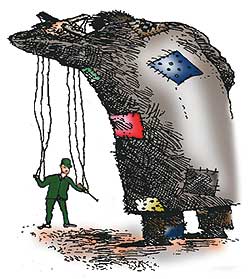 The signing of the Agreement of Commerce and Friendship between Nepal and the United States on 25 April, 1947 marked the start of a formal diplomatic relationship between two unequal nations seven seas apart. Fifty-five years after, it appears as if the warmth that characterised this relationship during the Cold War years in between is somehow gone.
The signing of the Agreement of Commerce and Friendship between Nepal and the United States on 25 April, 1947 marked the start of a formal diplomatic relationship between two unequal nations seven seas apart. Fifty-five years after, it appears as if the warmth that characterised this relationship during the Cold War years in between is somehow gone. We are still the best of friends, but the bond between Nepal and the United States is that of cordial formality, somewhat like the distant intimacy between two meets of different castes. It lacks the spontaneous bonhomie that should have developed over the years. As the slang of years past would have it, we continue to be pals, but we aren't buddies anymore.
The early years of our relationship were full of hope. In the 50s, US assistance concentrated on infrastructure. The 60s saw USAID in action against malaria in the inner tarai. During the 70s, US think-tankers introduced the concept of integrated development for the uplift of the rural poor. These areas of emphases had mixed results, but in general, their contribution was considerable in modernising Nepali society.
Things started to go horribly wrong in the 1980s, when Reagonomics came to dominate American diplomacy. Bilateral assistance to Nepal was substantially reduced, and the Bretton Wood Sisters-the IMF and the World Bank-gained prominence. Just as in other developing countries, the mantra of macroeconomic reforms was sold as the fillip for economic growth, and the status of HMG's Ministry of Finance was reduced to that of an executing agency implementing the policies set for Nepal by the bigwigs at the Washington Consensus.
At the height of privatisation and the free-market ideology, US Ambassador to Nepal Julia Chang Bloch used to strut about the corridors of power in Kathmandu like some latter-day viceroy. Bloch used to treat HMG ministers like loyal minions. Ambassador Michael E Malinowski was her deputy back then, and he must have vivid memories of his boss throwing her weight around Singha Darbar and playing matchmaker to the high and mighty of the land.
Despite the departure of Madam Chang in 1994, the attitude of the US towards Nepal hasn't changed much. The diplomatic mission in Panipokhari continues to be a fortress defending what Ignacio Ramonet, editor and publisher of Le Monde Diplomatique, calls "the other axis of evil" comprising the IMF, and the World Bank.
Such misplaced priorities devastate the political economy of poor countries. Their impact on Nepal has not been any different. Empirical studies are needed to establish precisely the correspondence between structural adjustment and privatisation of national economies on the one hand, and the rise of insurgencies and increase in corruption on the other. But that there is a direct link between these two trends is fairly clear.
Had there been a dispassionate critique of American policies in Nepal, the damage could have been controlled. Unfortunately, the constant meddling of the Washington Consensus elicits a response too predictable to spur a rethinking. The Nepali Right greets even mundane announcements of Fortress Panipokhari with an enthusiastic round of applause. The very same decisions irk our Left so much that they vent all their spleen on "American Imperialism". Is it any wonder then that nothing more than a sneer greets our parroted responses?
Perhaps it is necessary to examine our expectations from each other in order to re-orient the Nepal-US relationship. Nepali left-liberals must recognise that Americans are more interested in an economic free market than in a politically free society. All over the Third World, the worst dictators have always counted upon the unflinching support of Washington. Recently, when President Hugo Chavez was disposed in a coup by junior officers of the Venezuelan army, Americans were the first and the only nation to greet the coup-makers. Now that he is back in the saddle after two days in military custody, Condoleezza Rice sees no irony in preaching the merits of democracy to President Chavez!
A corollary to the myth of the US as promoter and protector of democracy the world over is another instance of misplaced faith: Americans have little interest in Nepal, other than their altruism. Nothing could be farther from the truth. As an imperial power without parallel and precedent in human history-not even Rome in its glory days or the British during their "sun-never-sets" years had such control over the destiny of the human race. But the Americans are acutely aware of their vulnerability. Even a tiny spark anywhere on the globe can ignite an inferno and consume the capitalist order that ensures American dominance of the world. Put simply, we are all Americans culturally and economically, thus we have the power to attract and keep US interests on our side. American benevolence is no charity; it is a necessary cost of protecting their global interests.
An anniversary is not just a celebration, it is an occasion to ruminate over the lessons of the past and formulate programs for a desired future. The US insistence on market liberalisation during the last two decades has failed to purify Nepali politics and succeeded exceedingly well in ruining our society. There is an urgent need to throw away this unholy triumvirate of liberalisation, privatisation and globalisation from the cliff of reality and bring in some genuine welfare and humanism.



